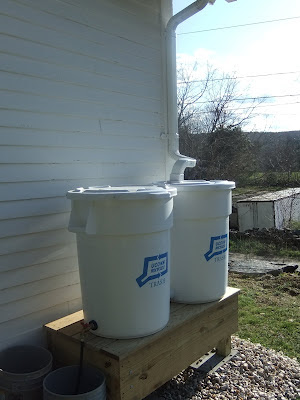With the season progressing and the weather getting warmer, the Spring Valley Farmers have begun to do more outdoor tasks. This is the yard in front of Birch Cottage, once littered with leaves, invasives, and fallen branches; now it's all been beautifully cleared away, and with only the minor cost of us getting covered in poison ivy.
Lina's gooseberries are looking good! A couple of weeks ago we planted several gooseberry and raspberry cuttings in the predominantly vacant plot of land behind Birch Cottage. Despite the lack of rain and the cold temperatures, they all seem to be thriving! With the additional sprouting of new strawberries and lingonberries, this summer is looking berry good :B
Birch now has rain barrels! Aren't they fancy?
Behold, The Rock Wall! Constructed by us from the rocks in our very own soil, it stands as a testament to our diligence, ingenuity, and the intrinsic beauty of rocks on rocks. If you're not as impressed as we are, it's because you haven't seen it in person.
Despite the fact that seed planting and contra dancing were cancelled due to the cold and wet weather, SVSF still managed to have an incredibly successful Potluck on Saturday March 31. Dishes included sweet potato and veggie fritters, eggplant casserole, baked chicken, pasta, salads, dips, banana bread, pumpkin muffins, and plenty of cookies all made by fellow farmers and guests!
Off we go for an after dinner walk around to the river.
And here is our special "Rorschach Rabbit" which we use to psychoanalyze and gauge the temperament of our farmers. Now tell me, what do
you see?
-->Paul








































